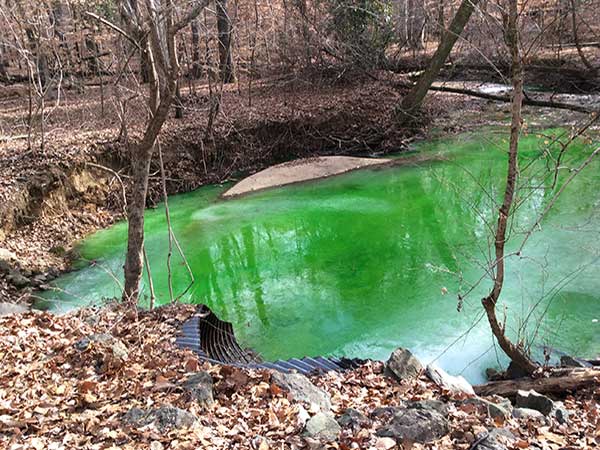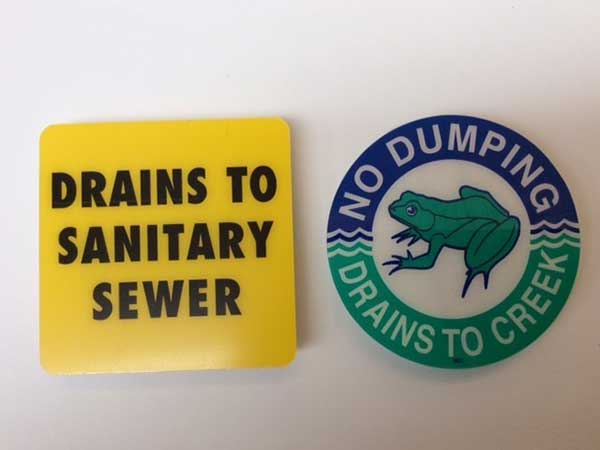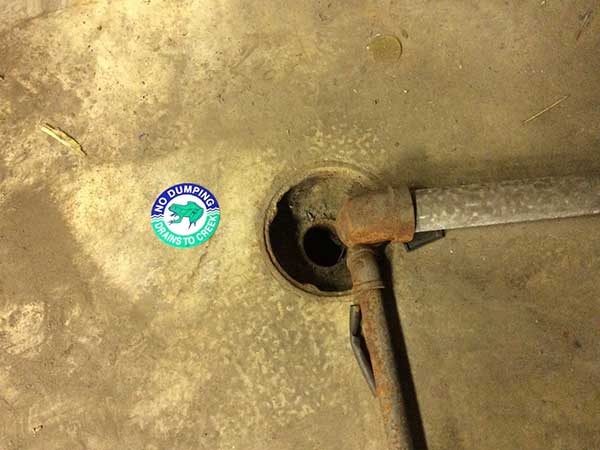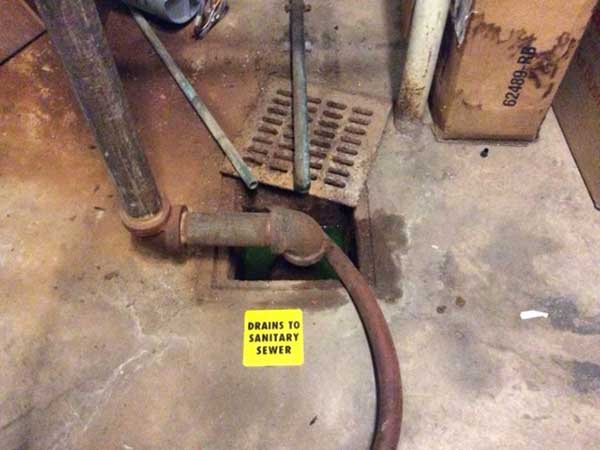Illicit Discharge Detection and Elimination (IDDE)
What is an Illicit Discharge?
An illicit discharge is the release of pollutants to UNC-Chapel Hill’s storm drainage system via overland flow or by direct dumping of materials into a catch basin, curb gutter or grated inlet (e.g. storm drains). Storm drain pipes connect directly to local creeks without filtration or other treatment. Illicit discharges can have a negative impact on water chemistry and aquatic health.
What is UNC-Chapel Hill’s Illicit Discharge Policy?
UNC-Chapel Hill has an Illicit Discharge Detection and Elimination (IDDE) Policy. This policy explains UNC-Chapel Hill’s pollution prevention requirements in more detail and includes a list of stormwater discharges that are allowed into the storm drains in incidental quantities or from public safety response (e.g. fire-fighting water). The Policy also contains information on enforcement procedures, inspections, and training.
How Do We Identify Illicit Discharges?
Illicit discharges are identified through routine inspections by EHS, Grounds, and Energy Services staff and by incident reports from the campus community. Creek water or materials in or near a storm drain may have an unusual color or odor, or they may have unacceptable water chemistry when measured with monitoring equipment.
Creek Inspections
Campus creeks are inspected regularly by EHS. Inspections are done following periods of dry weather, which ensures that flow in streams will be minimal and any illicit discharge pollution will be more highly concentrated and easier to detect. The person inspecting the creek checks for color, odor, and unusual materials in the water, and uses testing equipment to measure levels of pH, dissolved oxygen, temperature, conductivity, salinity, and turbidity (cloudiness).
What Happens When We Find Evidence of an Illicit Discharge?
Once discovered, EHS locates the sources of the pollution. This often involves partnering with other UNC departments like Grounds, Energy Services or Facilities Services, and sometimes also with non-UNC-Chapel Hill organizations such as the Town of Chapel Hill or OWASA.
Stormwater Discharge Prohibitions
The following discharges are prohibited from the UNC-Chapel Hill stormwater system by our Phase II Stormwater Permit:
- petroleum products and petroleum derivatives
- food, kitchen waste, and cooking grease
- dishwater
- laundry and housekeeping washwater
- equipment washwater (including cement truck rinse water)
- chemical waste
- animal fecal waste from laboratory animal facilities
- steam condensate or any other heated water
- contact cooling water and chilled water
- floor drain water from areas containing machinery or maintenance shops
- air conditioner condensate that has been treated with biocides
- water from crawlspace pumping
- water from power washing operations
- water from sanitary sewer lines
Dye Testing
Another way to detect illicit discharges is through dye testing. Dye testing can help determine the flow pattern of leaking or incorrectly connected pipes. UNC-Chapel Hill is an older campus with an aging system of sanitary sewer and storm sewer pipes, and we sometimes find these “cross-connects” in older mechanical rooms or basement facilities connected to a water supply.
To do a dye test, bright yellow-green, nontoxic dye is poured into the drain or pipe in question. Water is added to the drain, and observation areas are set up at the closest point where the water can be seen flowing in the stormwater and sanitary sewer systems. If the dye appears in the sanitary sewer pipe, it will continue to the wastewater treatment plant. However, if the dye is observed in the stormwater pipe, the water will continue to flow to one of the campus creeks. The nontoxic dye causes the creek to appear green for a few hours, but the dye breaks down in sunlight and will not harm aquatic life. The drain for the pipe that is connected to the creek is labeled “No Dumping, Drains to Creek”, and is put on a priority list for reconnecting properly to the sanitary sewer.
Notifying the Campus Community
When the green water from dye testing ends up in a campus creek, EHS sends out a campus-wide e-mail alert. For example:

Special Projects
If the drains are discovered to connect to the storm drain system, EHS works with the maintenance staff to capture any potential pollutants by using large plastic drums or another collection method. Then, the pipes are added to a list of upcoming maintenance projects so they can be rerouted to the sanitary sewer.



In 2015, EHS led an extensive analysis with the help of Athletics, food vendors, Energy Services, and Grounds. A few plumbing cross-connects in the concession stands were identified and immediately corrected by installing new plumbing pipes, and new policies and training procedures were implemented. Food vendors, housekeeping crews, volunteer concessions operators, and construction and maintenance contractors are required to comply with UNC-Chapel Hill’s stormwater protection guidelines. The organizations are made aware of UNC-Chapel Hill’s requirements through training, handouts, signage, and, in some cases, legal contracts.
These stringent requirements help us protect our local natural resources while thousands of visitors enjoy cheering on the Carolina football team.
